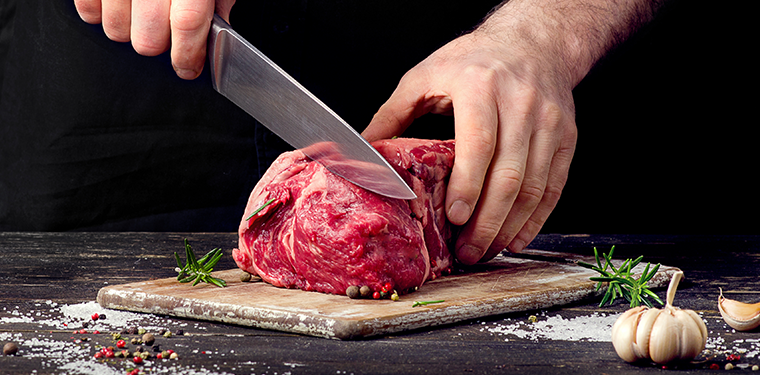
Curious about the carnivore diet? Some people claim that eating only meat improved their health, while researchers warn of deficiency risks. Read on to learn more, and then check out our other posts in the series.
What Is the Carnivore Diet?
Only Meat?
The carnivore diet, also called zero carb, is exactly what it sounds like: its adherents eat only meat. Some people are more strict than others about what counts as meat; animal products like milk, cheese, and eggs are a topic of debate. Some people salt their food which can provide some minerals, while others claim not to need it.
People most commonly say that they are following a carnivore diet to alleviate autoimmune or inflammatory issues.
Critics of the carnivore diet say that it destroys the intestines and can’t provide all the nutrients the human body requires. On the other hand, people like the Maasai and Inuit eat traditional diets of almost exclusively meat [1, 2].
Carnivorous Cultures
Generally speaking, the colder the environment, the less plant life grows there. This means that people who traditionally live in cold climates tend to eat more meat and fewer plants. The Chukotka people of Siberia and the Inuit and Eeyouch of Canada are great examples of such cultures [3, 4, 5].
However, none of these cultures completely cut plants out of their diets; in fact, they travel great lengths to gather and eat fruits, roots, and medicinal herbs during the warmer seasons [3, 4, 5].
The vast majority of a traditional Eeyouch (the Cree of northern Quebec) diet is made up of wild game like moose and caribou, goose, and fish.
However, during the summer months, they gather large quantities of wild blueberries and Labrador tea. They also make tea with white spruce needles and gather a variety of medicinal plants and mosses [5, 6, 7].
Even the Maasai people of Kenya and Tanzania – whose famous carnivorous diet is made almost entirely of cow’s blood, meat, milk, and honey – eat herbs, roots, and tree bark as part of traditional medicine [8, 9].
Snapshot
Proponents:
- Eliminates potential plant-based irritants such as gluten & lectins
- High in protein
- Devoid of sugar and processed foods
- Claims of weight loss
Skeptics:
- High risk of nutrient deficiencies
- Doesn’t contain healthy plant compounds like polyphenols & fiber
- May result in lower brain serotonin
- Increases oxidative stress
- May dysregulate the gut microbiome
- Large carbon footprint
- Expensive & inaccessible to many
Why Do People Start the Carnivore Diet?
So, what’s the deal? Why do this? The health effects of the carnivore diet are poorly studied, but its proponents have a few arguments.
One such line of reasoning is evolutionary. Some people claim that humans are “meant” to eat meat because when our ancestors started eating meat, the extra energy and protein helped them get bigger, faster, and smarter quickly.
Indeed, the historical transition from a plant-only diet to an omnivorous diet coincided with a massive expansion in brain size. However, this change likely had much more to do with increased energy from fat, rather than anything special about the meat itself [10, 11].
Advocates say that people eating a carnivore diet have lower nutrient requirements, that they can get all the vitamin C they need from meat, and that nutrients are more bioavailable in meat anyway. Some claim this diet cures a long list of diseases (we address these claims in another post).
Most people on a carnivore diet claim they eat this way to avoid the “toxins” or antinutrients in plant matter. They point to compounds like gluten, oxalates, lectins, histamine, and other plant-based irritants, which may cause illness in those who are sensitive [12, 13, 14].
However, there is almost no research to support many of the more common claims made by carnivore diet advocates – and significant evidence to the contrary. We took a deep dive into the science to address all the common arguments from carnivores in this post.
Carnivore Diet Experiences
Positive Anecdotes
People who eat carnivore or zero carb diets have formed active, engaged communities online with lots of user experiences, anecdotes, and recommendations.
Many people who eat a carnivore diet say that they have more energy and mental clarity.
Some people claim that the carnivore diet improved or eliminated their irritable bowel symptoms. However, some people also describe a difficult transition period of nausea, vomiting, and diarrhea.
Negative Anecdotes
Other people have horror stories. Some developed scurvy and their teeth and hair started falling out. Others fell into depression and craved fruits, vegetables, and sugars.
Some reported that thyroid problems, high cholesterol, and menstrual irregularities emerged after several months on the carnivore diet.
Many people who eat a carnivore diet are not extremely strict. They say that they eat a ketogenic diet or low carb high fat (LCHF) diet in social settings and eat only meat in the comfort of their home.
Strict adherents to the diet describe nausea, vomiting, diarrhea, and severe fatigue after eating a piece of bread or fruit.
Deficiencies From the Carnivore Diet
The glaring drawback of the carnivore diet is what’s missing from the meat.
The common commercial cuts of beef, pork, and chicken do not contain all of the vitamins, minerals, and compounds required for human health… and over enough time, these deficiencies can be extremely dangerous.
That said, most of the nutrients listed here can be found in organ meats: liver, kidney, sweetbreads, lungs, brain, and so on. Thus, the key may be that many people eating a carnivore diet do not eat enough organs.
Some people may also need more than the recommended intakes of certain nutrients for optimal health [15]. See more about carnivore diet deficiencies here.
Bottom line: if you have your heart set on the carnivore diet, we strongly recommend working with a licensed nutritionist or a doctor to ensure that you don’t seriously damage your health in the process.



